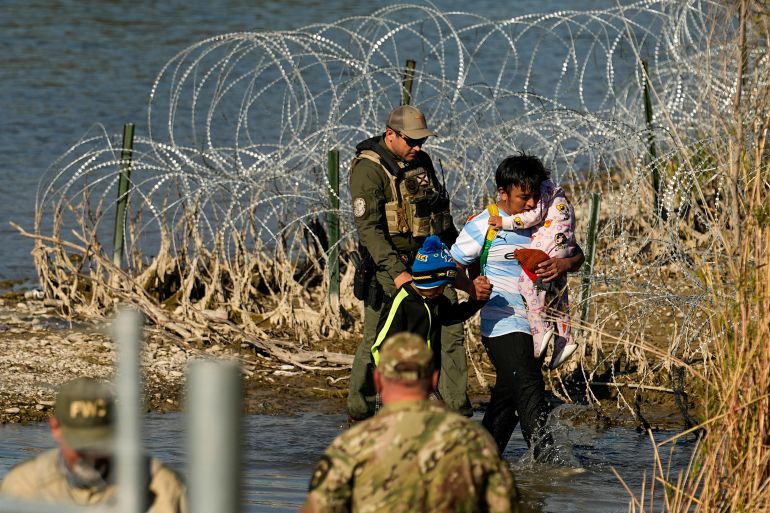US appeals court blocks Texas from arresting and deporting migrants
Strict law enabling authorities to arrest migrants put on hold hours after Supreme Court allowed it to enter into force.

A US federal appeals court issued an order that prevents Texas state authorities from detaining and deporting migrants and asylum seekers suspected of entering the United States illegally, hours after the Supreme Court allowed the strict new immigration law to take effect.
The decision on Tuesday by the 5th US Circuit Court of Appeals came weeks after a panel on the same court cleared the way for Texas to enforce the controversial law by putting a pause on a lower judge’s injunction, arguing that the federal government has authority over immigration matters, rather than individual states.
Keep reading
list of 3 itemsBiden and Trump visit US-Mexico border amid immigration crisis
How migration transformed an Indigenous town in Panama’s Darien Gap
By a 2-1 order, a panel of the appeals court lifted that pause ahead of arguments before the court on Wednesday.
Earlier on Tuesday the Supreme Court lifted a pause on the measure that critics have dubbed the “show me your papers” law, voting six to three to allow the law, Texas Senate Bill 4 (SB4), to go immediately into effect.
Legal scholars have argued that the law subverts the federal government’s constitutional authority to carry out immigration enforcement.
Rights groups have warned it threatens to increase racial profiling and imperil the rights of asylum seekers. The American Civil Liberties Union, for instance, called SB4 “one of the most extreme anti-immigrant laws ever passed by any state legislature” in the US.
The administration of President Joe Biden has challenged SB4 on the grounds that the law is unconstitutional.
Legal whiplash
The appeals court move is the latest twist in a complex legal saga.
A federal judge last month temporarily blocked the law passed by the Republican majority in the Texas state legislature saying it “conflicts with key provisions of federal immigration law”.
But a conservative-dominated appeals court then said SB4 could go into force unless the Supreme Court ruled otherwise.
The nation’s highest court issued a temporary stay on SB4 earlier this month but voted to lift it on Tuesday, allowing it to take effect while legal challenges play out in lower courts.
Texas Governor Greg Abbott and state Attorney General Ken Paxton, both Republicans, have argued the SB4 runs parallel to, but does not conflict with, federal US law.
In a post on X on Wednesday, Abbott, who had earlier called the Supreme Court decision “a positive development”, said: “Hundreds on the terror watch list have entered our country illegally under President Biden. This will not stand.”
Paxton, whose office is defending the law in court, earlier described the Supreme Court decision as a “huge win”.
The pair have become national conservative figureheads in their criticism of the Biden administration’s border policy, an issue set to dominate the 2024 presidential elections.
Texas, a southwestern state, shares a 3,145km (1,954-mile) border with Mexico. Texas leaders have said the new law is needed to control the record numbers of irregular crossings along the border in recent years.
Signed into law in December, SB4 is an extension of Abbott’s “Operation Lone Star“, a border security programme launched in March 2021 and has since grown into a $12bn initiative.
Under the programme, the governor has planted razor wire along the border, built a floating fence in the Rio Grande, surged the number of Texas National Guard members in the area and increased the amount of funds available to local law enforcement to target migrants and asylum seekers.
‘Chaos and abuse’
Mexico’s government had previously decried the law as “inhumane”.
Those arrested face up to six months in jail for an initial offence, with repeat offenders facing up to 20 years. Judges are permitted to drop the charges if a person agrees to be deported to Mexico, regardless of their country of origin or if they have an asylum claim in the US.
Human Rights Watch said on Tuesday said the law violates US asylum obligations and federal law. “Allowing Texas to run with its draconian system of criminalisation and returns of asylum seekers is a recipe for chaos and abuse,” said Bob Libal, a Texas consultant with the organisation.
“SB4 will not only make communities in Texas less safe, it will also burden law enforcement, and sow chaos and confusion at our southern border,” White House spokeswoman Karine Jean-Pierre said after the Supreme Court move.
“SB4 is just another example of Republican officials politicizing the border while blocking real solutions.”